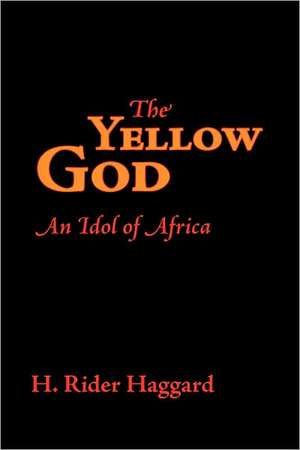The Yellow God
Autor H. Rider Haggarden Limba Engleză Paperback – 30 iun 2008
| Toate formatele și edițiile | Preț | Express |
|---|---|---|
| Paperback (7) | 74.63 lei 3-5 săpt. | |
| – | 74.63 lei 3-5 săpt. | |
| CREATESPACE – | 75.34 lei 3-5 săpt. | |
| CREATESPACE – | 102.86 lei 3-5 săpt. | |
| Alpha Editions – 16 feb 2018 | 104.50 lei 6-8 săpt. | |
| Classic Books Library – 30 iun 2008 | 105.03 lei 6-8 săpt. | |
| Borgo Press – 28 feb 2002 | 113.19 lei 6-8 săpt. | |
| CreateSpace Independent Publishing Platform – 9 dec 2015 | 131.08 lei 6-8 săpt. |
Preț: 105.03 lei
Nou
Puncte Express: 158
Preț estimativ în valută:
20.10€ • 20.86$ • 16.80£
20.10€ • 20.86$ • 16.80£
Carte tipărită la comandă
Livrare economică 17-31 martie
Preluare comenzi: 021 569.72.76
Specificații
ISBN-13: 9781600968655
ISBN-10: 1600968651
Pagini: 264
Dimensiuni: 152 x 229 x 15 mm
Greutate: 0.39 kg
Editura: Classic Books Library
Locul publicării:United States
ISBN-10: 1600968651
Pagini: 264
Dimensiuni: 152 x 229 x 15 mm
Greutate: 0.39 kg
Editura: Classic Books Library
Locul publicării:United States
Notă biografică
H. Rider Haggard (22 June 1856 - 14 May 1925) was an English writer of adventure fiction set in exotic locations and a pioneer of the lost world literary genre. His novels portray many of the stereotypes associated with colonialism, yet they are unusual for the degree of sympathy with which Indigenous populations are portrayed. Haggard also wrote about agricultural and social reform, in part inspired by his experiences in Africa, but also based on what he saw in Europe.After returning to England in 1882, Haggard published a book on the political situation in South Africa, as well as a handful of unsuccessful novels, before writing the book for which he is most famous, King Solomon's Mines. He accepted a 10 percent royalty rather than £100 for the copyright. A sequel soon followed entitled Allan Quatermain, followed by She and its sequel Ayesha, swashbuckling adventure novels set in the context of the Scramble for Africa. At the end of his life, he was a staunch opponent of Bolshevism, a position that he shared with his friend Rudyard Kipling. The two had bonded upon Kipling's arrival in London in 1889, largely on the strength of their shared opinions, and remained lifelong friends.
